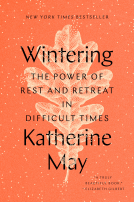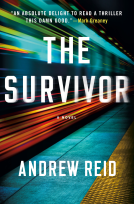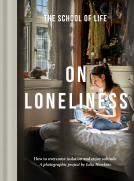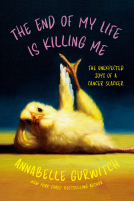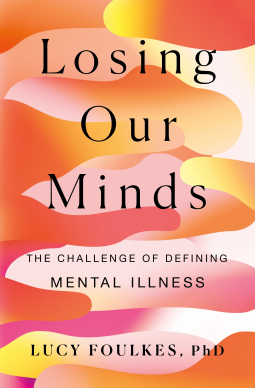
Losing Our Minds
The Challenge of Defining Mental Illness
by Dr. Lucy Foulkes
This title was previously available on NetGalley and is now archived.
Send NetGalley books directly to your Kindle or Kindle app
1
To read on a Kindle or Kindle app, please add kindle@netgalley.com as an approved email address to receive files in your Amazon account. Click here for step-by-step instructions.
2
Also find your Kindle email address within your Amazon account, and enter it here.
Pub Date Jan 25 2022 | Archive Date Feb 03 2022
Description
A compelling and incisive book that questions the overuse of mental health terms to describe universal human emotions
Public awareness of mental illness has been transformed in recent years, but our understanding of how to define it has yet to catch up. Too often, psychiatric disorders are confused with the inherent stresses and challenges of human experience. A narrative has taken hold that a mental health crisis has been building among young people. In this profoundly sensitive and constructive book, psychologist Lucy Foulkes argues that the crisis is one of ignorance as much as illness. Have we raised a 'snowflake' generation? Or are today's young people subjected to greater stress, exacerbated by social media, than ever before? Foulkes shows that both perspectives are useful but limited. The real question in need of answering is: how should we distinguish between 'normal' suffering and actual illness?
Drawing on her extensive knowledge of the scientific and clinical literature, Foulkes explains what is known about mental health problems—how they arise, why they so often appear during adolescence, the various tools we have to cope with them—but also what remains unclear: distinguishing between normality and disorder is essential if we are to provide the appropriate help, but no clear line between the two exists in nature. Providing necessary clarity and nuance, Losing Our Minds argues that the widespread misunderstanding of this aspect of mental illness might be contributing to its apparent prevalence.
Available Editions
| EDITION | Other Format |
| ISBN | 9781250274175 |
| PRICE | $28.99 (USD) |
| PAGES | 272 |
Average rating from 34 members
Featured Reviews
 Reviewer 721193
Reviewer 721193
Losing Our Minds by Dr. Lucy Foulkes reminds us of how much the world has changed especially for our kids growing up. I have a young daughter and social media is everywhere. I worry about it affecting her and this book spells out the many ways it can help or hinder someone's mindset. Dr. Foulkes has a lot of references that one can use to research more on the topic. The last chapter goes over "Helping each other and ourselves". I appreciate this as we have to face up to the fact that social media is not going anywhere and we need to make sure we are open and honest with our youth.
Thank you Netgalley for this ARC.
 Erin C, Reviewer
Erin C, Reviewer
Special thanks to NetGalley and the publisher for a free, electronic ARC of this novel received in exchange for an honest review.
Expected publication date: Jan. 25, 2022
Dr. Lucy Foulkes is a UK-based psychologist, with a focus on adolescent mental health and development. Her novel, “Losing Our Minds” is a powerful look at how our definition of “mental illness” has changed over the years, what events and genetic material can contribute to the presentation of a mental illness, and the language and social vernacular used when discussing mental illness, and how it can be both positive and negative. As Dr. Foulkes focuses in her personal practice on young adults, they play a particularly prevalent role in her book as well, mainly focusing on the physiological and emotional effects of puberty on the brain, and the benefits (and disadvantages) of social media when it comes to adolescent identity and mental health.
Foulkes provides an engaging and interesting look at mental health, presented in a consumable way. She does not use heavy, scientific language, and she provides definitions and detail where necessary, without appearing condescending. “Minds” is broken down into chapters and sub-sections, and each one is as interesting as the next. Foulkes uses her personal experience with anxiety and depression as an introductory point (and she revisits it occasionally), but is clear to point out that individual experiences with mental illness do and will vary.
“Minds” discusses a lot of the ‘hot button’ issues regarding mental health in a way that presents both sides equally and represents them fairly. For example, Foulkes talks about social media’s negative influence on youth mental health, but also discusses the positive benefits. Similarly, she talks openly about the language we use when discussing mental health, and how it can both help and hinder those who suffer.
“Losing Our Minds” is an honest portrayal at how society sees mental health, and how it has changed over the years. Anyone with an interest in mental health (personally, academically, or both) will find “Minds” to be interesting and informative, and it will definitely leave readers with a new way to look at not only mental health, but society’s view of it, and how our own biases and behaviours may in fact be hurting those who suffer from it.
Very detailed book on the challenges of defining mental illness and mental health concerns. As a counselor I found this book fascinating, however it does seem like a book that will have a niche audience.
 Ashley P, Reviewer
Ashley P, Reviewer
Losing Our Minds: The Challenge of Defining Mental Illness by psychologist Lucy Foulkes explains why it’s so hard to define what mental illness is and how it happens. The author herself has experienced mental illness, and while this is not a major focus in the book, I thought it was great that she did bring that perspective into it.
The author explains that it’s important to understand not only what mental illness is, but also what it isn’t. Regarding the medicalization of mental illness, she advocates for making a distinction between normal, unavoidable human distress and the more severe manifestations that constitute illness. The book takes a very middle ground kind of approach, acknowledging that psychological pain exists, causes distress, and is valid, but recognizing that not all suffering constitutes a disorder.
The first chapter looks at reported rates of mental illness in the population, breaking down what those numbers mean and questioning whether or not more people are experiencing mental illness now compared to in the past. I thought the author did a good job of taking readers through her process of evaluating different statistics and making it clear that numbers can’t simply be taken at face value.
The book then looks at the normal/disorder continuum and how that fits with categorical diagnostic systems like the DSM. Attention is given to various factors that can influence the development of mental illness in the areas of biology, environment, and the various processes going on during adolescence. The author takes the approach that mental illness is complex, and it can’t be reduced down to either all one thing, whether that’s biology or environment.
There’s an interesting chapter devoted to social media, and again, the author’s approach was very balanced. She addressed both positives and negatives associated with social media use, cautioning against oversimplification, especially when there isn’t a lot of data to go on. She suggested that social media may be more likely to reflect and amplify what’s already going on for individuals rather than create brand new issues. For example, cyberbullying is a problem, but most people who are being cyberbullied are also being bullied in their in-person world.
After looking at these different factors that can influence the development of mental disorders, the book returns to the question of whether mental illness is becoming more prevalent, as seems to be a common perception. The author points out how difficult this is to determine. For example, if suicide rates are going up, how much is that influenced by changes in reporting of suicides (in 2018, the standard for reporting suicides in England and Wales shifted from beyond a reasonable doubt to a balance of probabilities) or under-treatment of depression in children and adolescents due to the FDA black box warning on antidepressant use in this population group?
In the chapter devoted to language, the author advocates for reserving some language for serious illness rather than using the language of disorder to refer to all experiences of distress. She adds that linguistic inflation can contribute to people getting the wrong advice for what they’re actually experiencing.
The book ends with two chapters focused on getting help. The first is about professional help, the different forms that may take, and the reality of how difficult it can be to actually access. The final chapter looks at ways we can help ourselves and other people in our lives. The author reiterates that experiencing distress is hard, but it’s a fundamental part of being human, and not everything is immediately fixable.
I really liked this book. There’s so much talk of black and white in popular conversations about mental health and illness, and this book fully embraces the grey areas. The author skillfully validates both illness and non-illness experiences of suffering, while at the same time establishing that treating all experiences of suffering as though they’re the same or as though they’re all disordered doesn’t serve anybody.
The book brings together a lot of different ideas about mental illness in a very balanced way, making it clear that not every idea is going to match up with every individual’s experience. The author draws on a lot of research findings, but these are presented in an accessible way, with appropriate context to help readers understand what those pieces of information actually mean.
I was impressed by the way that the author presented the complexity of mental illness in a simplified way without sacrificing that inherent complexity or getting into reductionism. Overall, I thought that the book was extremely well done, and it will make an interesting read both for people who have personal experience with mental illness and those who do not.
I received a reviewer copy from the publisher through Netgalley.
Losing our Minds by Dr. Lucy Foulkes is an insightful & informative book. I appreciate the author's conversational writing style. Having read the book I have a better understanding of what mental illness is and isn't. The book clearly lays out where we as a society are in the journey of understanding mental illness. One take way that I found helpful is the idea that some negative emotions are a normal part of the human experience and having them doesn't necessarily mean that something is wrong. That concept seems simple but I found it to be a liberating reminder. Overall the book is well written and relevant.
No tengo idea de por dónde debería empezar porque sencillamente el libro es una belleza de principio a fin. Cada página, párrafo, y hasta líneas, llenas de información de manera sencilla, directa, pero a la vez detallada, explicando el complejo y a veces hasta controversial tema de la salud mental, cómo ha cambiado nuestro entendimiento al respecto.
Desde sus orígenes, posibles causas, efectos de las redes sociales, de la familia, entorno, biología, y muchos temas más que están estrechamente relacionados, la Dr. Lucy Foulkes da respuestas a casi todas las preguntas que alguien podría tener al respecto. Quedan algunas interrogantes sin resolver porque no hay suficiente información, o porque los medios para conseguirla serían poco éticos.
Reseña completa (24-Ene): https://tintanocturna.blogspot.com/2022/01/resena-review-losing-our-minds.html
I have no idea where I should start because the book is simply beautiful from start to finish. Each page, paragraph, and even lines, full of information in a simple, direct, but at the same time detailed way, explaining the complex and sometimes even controversial subject of mental health, how our understanding of it has changed.
From its origins, possible causes, effects of social networks, family, environment, biology, and many more topics that are closely related, Dr. Lucy Foulkes gives answers to almost all the questions that someone could have about it. Some unanswered questions remain because there is not enough information, or because the means to obtain it would be unethical.
Full review (24-Jan): https://tintanocturna.blogspot.com/2022/01/resena-review-losing-our-minds.html
 Abby S, Reviewer
Abby S, Reviewer
Fascinating informative book Dr. Lucy Foulkes has a conversational style of writing.I felt even though mental health can be a scientifically difficult subject I was really interested and gained a lot of perspective.Will be recommending.#netgalley #losing our minds.
Real Rating: 3.5* of five
The author identifies and discusses, in clear and un-jargonized even-handed ways, the many poles of our society's increased awareness of mental health issues. Has the openness resulted in more frank and open acknowledgment of the central issue, or has it resulted in armchair psychologists diagnosing themselves and others with serious problems and then browbeating physicians into prescribing expensive medications for them? That answer is "yes" and that should tell you whether this is the book for you.
Highly recommended for anyone who's said, "that orange guy's a narcissist," and felt smugly superior about it. Like me.
Dr. Lucy Foulkes is a UK-based Psychiatrist who has written a very timely and important book about understanding mental illness - and helping destigmatize it as well as differentiating between general anxiety disorders and more chronic mental illness. There has been a lot of press in the US and the UK about the rising prevalence of anxiety among the younger generations. Many causes have been attributed (but not grounded in scientific research) such as social media influences, parenting, the "snowflake" generation, etc. Her book meticulously cuts through all of the noise to help reframe what is mental illness and in turn appropriate interventions based on the diagnosis. She also sheds light on different aspects of mental illness which is helpful since often we see it all lumped together in one bucket. As a parent, I found her research and explanations extremely informative and enlightening.
This is a good comprehensive discussion about mental illness. To start, the authors takes on what actually defines clinical illness versus normal reactions to stressful events. An actual diagnosis through that is most used is the DSM-5, but this changes many times. Illness is not so easy to put in one category and often what matters is the degree of suffering, the change in one’s ability to manage their life, and the longevity of it. It is important to know that chronic mental illness often starts in adolescence. Severe illness is easier to see, and almost always shows up before age 24 years. Subtler illness the author argues may not be clinical illness, but actually adapting to life stressors such as grief, loss, and normal anxieties as life changes. This was easy to read and understandable information.
The introduction of Social Media was discussed primarily about young people. Yes, it can have a profound effect on vulnerable individuals as you can look up Pro-Anorexic sites and find others, sort of normalizing the behavior. I definitely think some guidance is needed for young adults to identify dangerous behavior and be discouraged from seeking these sites out. However, there are many social media sites that are from people active in recovery that can offer help and hope to those who are suffering. I do think Social Media can be a serious problem as people are always on and managing their ‘Public Branding’ of themselves. I am not sure seeing and reading only the best of others lives is true or helpful long-term. Yet, Social Media is new and all new things usually present both positive and negative outcomes.
Discussion of the Covid-19 Pandemic I thought was very good. How much effect it will have really is yet to be seen. Will there be resiliency and most ok or as this drags on longer and longer, will we see more pathological illness.
This was written by an author living in the UK so some issues are different. Yet, it seems like waits for help are long there, too. Yet, often people in the US can not access services due to lack of adequate health insurance. This is a huge barrier.
Discussion about biological pre-disposition offers insight, but it is hard to pin down. We are unlikely to find an ‘anxiety gene’, it is far more complex then this, yet clearly it plays a crucial role. Hearing that Anti-Depressants in clinical trials offer little more positive results then a placebo is certainly troubling, but hardly new news.
So, I thought the author covered a lot of ground quite well. People with chronic mental illness need more support then 10 minute psychiatric visits. It seems obvious that managing an illness requires more then just a quick visit for medicine and more clinicians to talk to about how to best cope with this. Also, there is a big gap about talking about illness, seeking help, and then you are left on your own. More after care for longer periods of time is needed, the same as is done with physical illness. Another important point is how mental illness has a strong genetic component. It was not really discussed how having family members ill and the chronic stress this causes on an individual and what support is actually available. I would say little. It is a serious problem.
Overall, a very thorough book that is trying to look into the multi-faceted issue of mental illness, from the mild to severe. I found this book offered much needed information.
I had both the e-book an the audio 🎧 version for this book. I think with non-Fiction that enhances the books.
Thank you NetGalley, Luck Foulkes, St. Martin’s Press and MacMillan Audio for a copy of both the e-book and the audio book. I very much appreciate this.
 Nancy F, Reviewer
Nancy F, Reviewer
A Look at Mental Illness Today
Dr. Lucy Foulkes, the author, herself a sufferer with anxiety and depression, gives a clear description of many of the problems plaguing the identification and treatment of mental illness today. There are more effective treatments for mood disorders than there were in the past, but there is also much news about the subject. The main stream media is often more sensationalist than helpful in discussing treatment options.
Dr. Foulkes simplifies many of the concepts and deals with a wide variety of topics from social media in both good and bad aspects to the way we talk about mental health symptoms and how it can help people to be more accepting. However, it can create an environment where people not experiencing actual medical symptoms can get caught up in diagnosis and treatment whether they need it or not. While effective in severe cases, the treatments also come with side effects that can be devastating.
I found this a very readable book on a somewhat difficult and controversial subject. It provides good technical information. It also provides a perspective on both individual mental health problems and treatments and gives a perspective on the societal problems of mental health identification and treatment.
I received this book from St. Martin’s Press for this review.
 Linda S, Librarian
Linda S, Librarian
LOSING OUR MINDS by Lucy Foulkes discusses "The Challenge of Defining Mental Illness" in an accessible and engaging manner. Unfortunately, I missed the archive date and was not able to see the full preview, but I do think that staff members and some students (possibly Psych classes) will be interested. Dr. Foulkes includes descriptions of her own experiences and puts special emphasis on Adolescence and Social Media. LOSING OUR MINDS was positively reviewed by Kirkus and Publishers Weekly; I am giving it a rating of 4 stars based on those comments and a brief look at Introduction and Table of Contents. Youth mental health is an extremely high interest topic for my students and their families. Just today The Wall Street Journal published a feature article titled “What Parents Can Do When Their Kids Have Suicidal Thoughts.”
Article Link:
https://www.wsj.com/articles/what-parents-can-do-when-kids-have-suicidal-thoughts-11643864461
An excellent and insightful discussion of the nuances and challenges relevant to diagnosing mental disorders. Definitely recommended for undergraduates considering a career in mental health and others who want to appreciate why we should be careful not to stigmatize people who live with mental health concerns, which is probably most of us.
 Jeremy R, Reviewer
Jeremy R, Reviewer
"Losing Our Minds" is a good book for anyone interested in a general understanding of mental illness, including how mental illness is defined, what we know and don't know about what causes or influences the development of mental illness, and how public perceptions match "reality" based on the available scientific/medical evidence. The author discusses media stories about increased mental illness in adolescents, increased suicide rates, and other sensational headlines and discusses what the research actually shows regarding these issues. Quite often, the reality is much more nuanced than the headlines would suggest.
One of the most useful/beneficial parts of the book is the author's discussion of social media and its impact on mental illness. She addresses the popular conceptions about social media and mental illness, and what research has shown about the connection between the two. She discusses the harms or potential harms from social media -- cyberbullying, access to information about self-harm, access to individuals or groups who promote self-harm behavior, etc., but she also discusses the potential positives of social media -- resource for information, connectedness, and a source of support and acceptance. If you are struggling with mental illness, but don't think family and friends will understand, it can be beneficial to discover others online who have some of the same thoughts, feelings, and fears, making you realize you are not alone.
The author ends the book by discussing various methods of treatment, as well as coping skills that are beneficial whether you are dealing with typical life stressors or dealing with a mental illness.
I received a copy of the e-book via NetGalley in exchange for a review.
Losing Our Minds by Dr. Lucy Foulkes: **** I received a free copy of this book from NetGalley for my honest review***
Losing Our Mind By Dr. Lucy Foulkes attempts to raise awareness of mental illness and the challenges of defining and treating these illnesses. Futhermore,it offers tools on how to approach mental illness if you or someone you know is struggling.
While this book was dry with statistics about mental health, I read it in one day. She writes an easy read for a nonfiction book on mental health. Dr. Lucy Foulkes introduces her book by telling us about her own struggles with anxiety. This is what I appreciated most about the book was when she was sharing her own story or quoting writers with mental illnesses. Numbers really can’t describe the human cost of a society that cannot give mental illness the resources it deserves. The personal stories also did a good job of distinguishing normal distress from mental illness.
With that said, it was impressive the amount of studies and research that fills Losing Our Minds. Most times, the studies showed that we still don’t have a solid answer for what causes and what cures mental illness. However, Dr. Lucy Foulkes takes great strides to argue that the genetics, environmental issues and stressors all take a part in why some people develop mental illness.
While I agree about mental illness being a combination of factors, clinicians don’t always treat patients like they are a complex combination of body, mind and environment. Yet, she states they know this in mental health research. Does that matter if that’s not patients’ experience, I wonder?
I think the book could have had more about systemic oppression and mental illness. Although, as I mentioned, there were some quotes from people with mental illness, I wanted more of experiences of people with mental illness as opposed to impersonal studies. Also, she did not include people who believe in reframing words like neurodivergent, which I found strange since she had a language chapter.
Also, while I think the book did a good job of debunking myths about anxiety and depression, I felt the framing of PTSD could have been better. In the book, she first talks about PTSD regarding war and terrorism. Fair enough because these were the first recognized causes of PTSD. But she continues to emphasize these causes in later discussions of trauma. And even though she mentions child abuse, especially sexual abuse and/or neglect, can cause PTSD, she doesn’t talk about how sexual assault and child abuse may be the highest risks for PTSD. Considering this is a book debunking myths about mental illness, it would be helpful to challenge the idea that PTSD is for military and the police.
This was a really informative book. I had minor issues with the book as mentioned before, but I learned a great deal from the quick read. I love the tools she offers at the end of the book, including how to work on your own mental health, how to bring awareness about mental illness, and how to help others. I give Losing Our Minds a 4 out of 5 stars.
 Geoff U, Educator
Geoff U, Educator
The theme of this book is "IT IS MORE COMPLICATED THAN THAT! THE BRAIN IS COMPLICATED AND MENTAL ILLNESS IS COMPLICATED AND WE BOTH NEED MORE AND BETTER THERAPY AND THERAPISTS AND TO NOT OVER DIAGNOSE!" And I am in full support of that thesis. But the problem with complexity is that people don't like it. In some ways the complexity of the brain and the emergent phenomena of thinking, feeling, behaving are beyond our ability to grasp in totality, and what's worse, nuance makes life harder and more difficult and we in many (most?) cases don't want that. So it makes this book feel a bit like a polemic aimed in all directions, both at the limitations of our current diagnostic model for mental illness, the wrongness of those who want to stigmatize or deny the ways our brans/minds can go wrong, and those who may not want to admit that calls for awareness and acceptance can have downsides (especially when mental health providers are underpaid and undervalued).
 Terri L, Media/Journalist
Terri L, Media/Journalist
Mental Illness has become less stigmatized over the yeas, but when people use mental health terms to describe simple emotions, it all gets jumbled up. This book helps sort out the mess that mental illness terms and the illnesses have become. Full of lots of information and simple explanations, this book cuts through the clutter and clears things up.
 Debra C, Reviewer
Debra C, Reviewer
Thank you Netgalley and St. Martin's Press for an advanced e-copy of this book. This book has been out a couple months and I am happy to see that it has such high ratings. I enjoyed Dr. Foulkes insights and highly recommend this book to a wide variety of audiences-- people suffering from mental illness, friends and family of people with mental illness, people who don't know if they have a mental illness... there is a lot of information that is pertinent to anyone who knows anyone else (which really should be everyone).
The thing that really struck me about this book, in comparison to other books that I've read about depression is that Dr. Foulkes talks about both what depression is and what depression isn't. There are so many articles lately that talk about the skyrocketing numbers of people with depression. Dr. Foulkes breaks down some of those numbers using research from longitudinal studies. She also refers to setbacks that people have had due to covid.
I know it's probably weird to say that I enjoy reading books about mental illness, but there is so much information out there that it can be overwhelming. I appreciate the simplicity of this book, but at the same time, the details and topics that Dr. Foulkes covered.
 Dee Dee (or DeeDee673 M, Reviewer
Dee Dee (or DeeDee673 M, Reviewer
This is a very detailed but easy to read bok that gives plenty of references to any mental health issues. What we now call an illness may have been in the past simply a normal change of mood or reaction to a real or perceived event or statement. Is being shy a social disorder now, grieving over a death is full blown depression etc. Perception and definitions are constantly fluid these days and it would seem that every human living is mentally ill by definition of the DSM 5. almost.to the point of ridiculous.
It's all in how you look at daily.life. Good reference for simple definitions.
I was given a advanced reader copy and was under no obligation to provide a reviwe. The opinions expressed are my own. Thanks to the author, publisher and NetGalley for allowing me to read this book.
This is such a powerful book about mental illness. The past few years have been hard for everyone dealing with a pandemic and new challenges. But it's been especially hard for children and we've seen such an increase in mental health issues with them. Thank you for tackling this topic and talking about it. Everyone should read this book. Thank you to NetGalley and the Publisher for an ARC.
Readers who liked this book also liked:
Annabelle Gurwitch
Biographies & Memoirs, Health, Mind & Body, Humor & Satire




